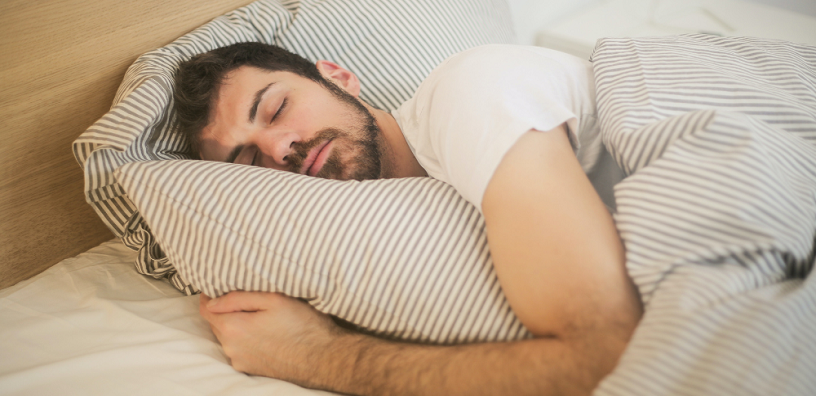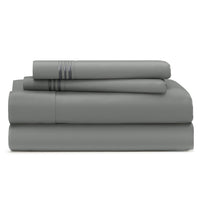
5 Tips for the Best Sleep: Sleep Science Basics
You’re not just resting when you’re asleep. Your brain and body are slowing down to be key players in complex biological processes for detoxification and recovery. When you don’t sleep, these critical processes are cut short. Things like basic thinking, concentration, energy levels, and mood all take a hit.[1]
So, in this case, when you snooze, you definitely do not lose.
Keep reading to learn about the regulation of your sleep-wake cycle (it’s easier than you think), using essential oils to relax, unwinding with therapeutic stretches, and so much more so you can make sure you’re getting the best sleep for the best you.

1. Regulate Your Sleep-Wake Cycle
In the daytime, you should get tired. When you’re using your day in a productive way by including routines and activity, you’re helping to regulate your body’s natural sleep-wake cycle. Activity throughout the day helps your body to produce hormones that make you feel alert and awake. Likewise, when you rest or sleep, your body produces different hormones that help you feel tired and ready for bed. By getting tired during the day, you are essentially priming your body for a good night's rest.
There are many ways to regulate this important sleep-wake cycle and get tired, such as:
- Exercising: Exercise is one of the best ways to tire yourself out. Even just moderate exercise, like a brisk walk or jog for at least 30 minutes daily, can help to improve sleep quality. Exercise also releases endorphins which have mood-boosting and pain-relieving effects, fostering relaxation for a good night’s sleep.[2] Get up and move around every 20-30 minutes. Take a break from work or school to go for a walk or do some other activity. It’s up to you!
- Avoiding caffeine and alcohol: Caffeine and alcohol can interfere with sleep. Caffeine is a stimulant that can make it difficult to fall asleep, while alcohol can disrupt sleep later in the night. It is recommended to avoid these beverages at least three to four hours before bedtime to help minimize any possible sleep disruptions.[3]
- Create a bedtime ritual: We will get more into this specific tip later in the blog (so keep reading!), but your sleep-wake cycle needs to be on a routine schedule. Are you hitting the hay at the same time each night? How are you prepping for a great sleep?
It is important to note that everyone is different, and what works for one person may not work for another. If you are having trouble sleeping, please consult your doctor. A trusted healthcare professional can help you determine the best way to get tired during the day and improve your sleep quality.

2. Take A Load Off
Remember how we said we would come back to the importance of a bedtime ritual? Here it is!
Bedtime rituals look different for everyone but will usually involve a variety of soothing routines to help you prep for an epic snooze. Just as it’s crucial to go to bed at the same time every night and wake up at the same time every morning, it is also crucial to unwind before bed.
Unwinding before bed helps your brain to distinguish the day from the night (there’s that sleep-wake cycle again), your mind and body to be clear of the day's stresses, and you to become relaxed for an easier time falling into a peaceful sleep.
Two things we recommend adding to your nighttime routine to relax and unwind are stretching and journaling. These might sound like an odd duo, but hear us out…
Stretching has been proven to improve flexibility and range of motion, reduce muscle tension (which can contribute to insomnia), and release endorphins. Why is this good for sleep, you ask? Because these factors make the act of falling asleep that much easier. Endorphins, as we mentioned before, are natural mood boosters and painkillers. These “happy” hormones and the release of built-up tension mean your body can be at ease for a better night’s sleep.[4]
Here are some simple stretches you can do before bed:
- Neck stretch: Gently tilt your head to the right, then to the left. Repeat 5 times on each side.
- Shoulder stretch: Bring your right arm across your chest and hold it with your left hand. Gently pull your right arm towards your chest. Hold for 30 seconds, then repeat on the other side.
- Torso stretch: Stand with your feet hip-width apart. Reach your arms overhead and bend to the right. Hold for 30 seconds, then repeat on the other side.
- Leg stretch: Stand with your feet hip-width apart. Reach down and touch your toes. Hold for 30 seconds.
Journaling is another great tool for relaxing, unwinding, and de-stressing after a long day. Not only does it help you process your thoughts and feelings, it can even help you to identify any stressors in your life that may be contributing to your insomnia or other sleep disruptions. Once identified, you can start to develop strategies for coping with them. It’s a win-win!
Here are some tips for journaling before bed:
- Find a quiet place where you won't be interrupted.
- Write about your day, including any thoughts or feelings you're having.
- Focus on the positive aspects of your day.
- End your journal entry with a positive affirmation, such as "I'm going to sleep well tonight."

3. Get A Shower
Lots of us may opt to get a hot shower in the morning to help us wake up (we totally get it), but instead, try taking your shower at night.
Both warm and cold showers have benefits when it comes to getting the best sleep at night.
The warmer water of a hot shower can help to soothe muscle tension and pain, promote brain health, and even improve cardiovascular health. The cooler water of a cold shower can help to decrease inflammation and swelling, improve blood circulation, lower cortisol levels, and reduce soreness.[5,6]
Both showers are also great for the production of melatonin, the “sleepy” hormone. After the warm and cold shower, your body’s core temperature drops (a natural process before sleep), which triggers the release of melatonin.[5,6]
Which type of shower is the best for you? We suggest trying the warmer shower to promote healthy thermoregulation and slow-wave sleep. However, if you're not sure which type of shower is right for you, you can try alternating between the two. It’s okay to experiment!
Here are some examples of how to use warm and cold showers to help you sleep and to also help you stay awake for your busy day:
- A warm shower before bed: Take a warm shower for 10-15 minutes before bed. The warm water will help to relax your muscles and prepare your body for sleep.
- A cold shower in the morning: Take a cold shower for 1-2 minutes in the morning. The cold water will help to wake you up and improve your alertness for the day ahead.
- Alternating warm and cold showers: Take a warm shower for 5 minutes, then a cold shower for 1 minute. Repeat this cycle 3-4 times. This can help to improve your circulation and reduce muscle tension.
If you want to have the ultimate spa experience each and every night before bed, start using The Cosy House Towel Set in your routine. These soft linens quickly absorb moisture for a cozy feel and premium luxury. There’s nothing better than wrapping yourself up in a warm, luxe towel after a relaxing shower!

4. Switch Out Your Old Sheets
Your bed sheets could be the culprit for your poor sleep. Here’s how:
- You’re still using cotton bedding. Cotton is notorious for retaining heat and soaking up moisture. We don’t love that for anyone. Why? Because that means your sheets can easily trap and collect little irritants that aren’t kind to your nose, skin, or sleep.
- They’re stained and old. It’s recommended that you wash your sheets at least once a week. Some folks might need to clean their sheets more often than that, especially if you let Fido sleep in the bed with you. As a rule of thumb, sheets should also be replaced after at least two years of use. Are your sheets icky, old, worn and torn, or maybe even have some visible signs of yellowing? If they are, you’re probably not comfortable when you’re sleeping either.
- They’re not durable. If you are washing your sheets once a week and with each trip to the washing machine you notice your sheets dulling, pilling, and tearing, you can bet your sheets aren’t doing you any favors when it comes to getting quality sleep.
- They’re not hypoallergenic. If you’re not keen on doing a load of laundry each week, you’ll need moisture-wicking and hypoallergenic bed sheets. Sheets that aren’t hypoallergenic mean a lot more cases of stuffiness and sniffling due to the common household non-living allergens.
- They don’t thermoregulate. The healthiest sleep happens when our bodies are cool, comfortable, and able to breathe. If you have low-quality sheets that don’t have any temperature-regulating properties, you’re in for a world of night sweats, tossing, and turning.
The consensus: it’s time to invest in better bedding. You’ll want sheets that are soft, silky, and breathable. Where can you find them? Right here.
100% Bamboo Bed Sheets are the perfect choice for the best sleep. Why? Take a look:
- Soft and Luxurious: You’ll want to sink in and stay awhile in these silky-smooth bed sheets. Our 100% bamboo viscose fabric allows you to enjoy resort-grade slumber right in the comfort of your own home.
- Breathable: Bamboo viscose fabric has natural thermo-regulating properties to help keep you cool and comfortable. Our sheets are lightweight, breathable, and wick away excess body heat for quality sleep every night.
- Hypoallergenic: These hypoallergenic luxe sheets have moisture-wicking properties, making them perfect for those with sensitive skin and noses, or who suffer from those infamous night sweats.
- Easy Care: They are machine washable, dryer-friendly, and easy to maintain. You’ll also be able to rest easy knowing these durable sheets will look and feel great for years to come, no matter how much you wash them.

5. Mist Your Room With Essential Oils
You’ve probably already heard the hype around essential oils and all their powerful benefits. What if you could get all those powerful benefits in the convenience of a single spray bottle?
The Cosy House Lavender Linen Spray is just that. Our spray freshens up your bedroom with gentle ingredients that leave a soothing scent behind. Inspired by aromatherapy, this deodorizing mist is formulated without aerosols, dyes, propellants, or synthetic fragrances, making it perfectly safe for those with sensitive skin and noses. But first, let’s dive into the ways lavender essential oil can help you get the best sleep.
Lavender has been shown to have several benefits for sleep, including: [6,7,8]
- Improves sleep quality: Studies have shown that the combination of healthy sleep hygiene and lavender essential oil can improve sleep quality for individuals suffering from sleep issues, such as insomnia.
- Increases time spent in deep, slow-wave sleep: Studies have shown that lavender odor has a therapeutic effect on the nervous system and when used as aromatherapy is beneficial for promoting deep sleep in young men and women.
- Relaxing and calming: Lavender has a calming and relaxing effect on the mind and body, which can help you fall asleep more easily.
- Reduces stress and anxiety: Lavender can help to reduce stress and anxiety, which can also contribute to insomnia.
Using our Cosy House Lavender Linen Spray can be a super easy way to get the many benefits of lavender essential oil for sleep. Here are some tips to use our spray:
- Spray it in your bedroom: Misting our essential lavender spray in your bedroom can help to create a relaxing and calming sleep environment. You can even spray it directly onto your bedding.
- Add a few sprays to your pillowcase: Adding a few spritzes of Cosy House Lavender Linen Spray to your pillowcase is an easy way to breathe in the essential oils while you sleep.
- Spray it in your bathroom before your nighttime shower: Taking a warm shower with our essential lavender spray filling the air can be a great way to unwind for bed.
Searching for more goodies to help you get the best night’s sleep? Click here to find a huge selection of home essentials to make your life, and your home, that much cozier.
We've gone ahead & enclosed a 10% off coupon below for you to use if you'd like to take the plunge and try out our sheets for yourself! To shop our collection & get 10% OFF Use the code 'BLOG10' at checkout.
What are your favorite ways to get good sleep? Let us know in the comments below. The Cosy community loves hearing from you.
Happy sleeping, sleepers - from all of us here at Cosy!
Resources:
- What happens when you sleep: The science of sleep. Sleep Foundation. (2022, August 29). https://www.sleepfoundation.org/how-sleep-works/what-happens-when-you-sleep
- Exercising to relax - harvard health publishing. Harvard Health. (2020, July 7). https://www.health.harvard.edu/staying-healthy/exercising-to-relax
- Krans, B. (2019, August 6). Sleep with coffee, alcohol and Nicotine. Healthline. https://www.healthline.com/health-news/it-might-not-be-the-coffee-that-causes-you-to-wake-up-during-the-night#:~:text=Why%20Alcohol%2C%20Nicotine%20Disrupt%20Your%20Sleep%20More%20Than%20Coffee&text=Researchers%20say%20nicotine%20and%20alcohol,sleep%20patterns%20for%20most%20people.
- Ahantke. (2021, June 24). The simple act of stretching. Center for Healthy Aging. https://www.research.colostate.edu/healthyagingcenter/2021/06/23/the-simple-act-of-stretching/#:~:text=Stretching%20reduces%20the%20muscle%20tension,decrease%20in%20depression%20and%20anxiety
- Okamoto-Mizuno K, Mizuno K. Effects of thermal environment on sleep and circadian rhythm. J Physiol Anthropol. 2012 May 31;31(1):14. doi: 10.1186/1880-6805-31-14. PMID: 22738673; PMCID: PMC3427038.
- Koulivand PH, Khaleghi Ghadiri M, Gorji A. Lavender and the nervous system. Evid Based Complement Alternat Med. 2013;2013:681304. doi: 10.1155/2013/681304. Epub 2013 Mar 14. PMID: 23573142; PMCID: PMC3612440.
- Lillehei AS, Halcón LL, Savik K, Reis R. Effect of Inhaled Lavender and Sleep Hygiene on Self-Reported Sleep Issues: A Randomized Controlled Trial. J Altern Complement Med. 2015 Jul;21(7):430-8. doi: 10.1089/acm.2014.0327. Epub 2015 Jun 2. PMID: 26133206; PMCID: PMC4505755.
- Goel N, Kim H, Lao RP. An olfactory stimulus modifies nighttime sleep in young men and women. Chronobiol Int. 2005;22(5):889-904. doi: 10.1080/07420520500263276. PMID: 16298774.


